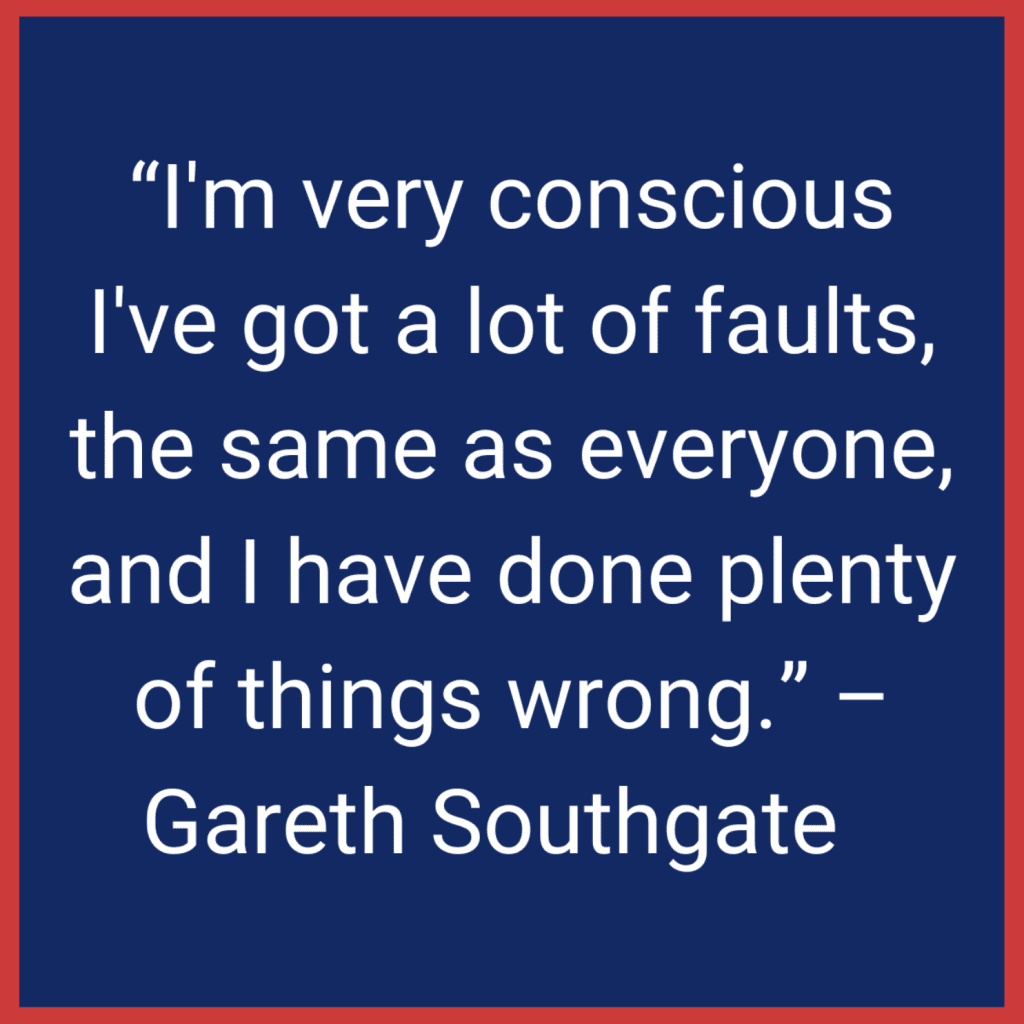7 February 2023

Developing The X-FACTOR To Transform Your Football Performances
How To Help Sensitive Footballers After They Make A Mistake
Making mistakes when you play football or soccer is a normal part of the game but is really hard for some people to take. You’ll often see the following on a pitch, from the bench or the stands when a mistake has been made.
- The footballer who has team-mates on her back because of the high standards expected at the level that they play at.
- The dad of a talented young footballer whose face and body language is appalling when his son makes mistakes.
- The coach who can’t control his emotions when his players take a risk that doesn’t come off and end up making a mistake.
- The footballer whose head goes down and hides from a game for 10 minutes or so because he’s dwelling on a mistake that he’s made.
- The spectators who shout abuse, telling the footballer that he is rubbish and isn’t fit to wear their shirt after making mistakes.
One part of the issue for the player, especially the player who is overly sensitive and hates making mistakes is that he or she will attribute a meaning to the mistake, this then causes a negative reaction. Here is an example:
Dan – a central attacking midfielder, who is great at carrying the ball forward at pace through the middle of the pitch is going through a period where his confidence is low and his team are struggling for results. His coach is feeling pressure as a result and when players make mistakes, he’s quick to tell them. A recent pattern that has happened is that players who have made numerous mistakes (in his eyes) have been shamed by the coach and have been substituted. Dan is one of these players.
Now, Dan has built up an expectation that if he runs with the ball in tight areas in the middle of the park and gets tackled or loses the ball that his coach will show his frustration, and most likely go on to substitute him.
Dan is in JUDEGMENT MODE in his mind, he sees himself as incompetent, judging himself against a different version of himself or against other players. He’s also in the FUTURE predicting what may happen if he makes a mistake. He starts building pictures in his mind of mistakes and experiencing big negative emotions such as embarrassment and shame. He also pictures his coach, remonstrating with him and adding to the sense of embarrassment and shame by carrying out his threats to substitute him.
His thought processes go like so: “I’ll play it safe, that way the coach won’t have a go at me”, “oh s##t that’s me off in 10 minutes”, “I’m rubbish” and “I want this game to end.”
So how do we help particularly sensitive footballers who hate making mistakes?
One thing coaches and parents can do is help them to start to change their meaning of mistakes, if we can do that then we can help them to respond differently.
1. Remind players and children that you are SUPPOSED to make mistakes.
For coaches – in training make sure that players are given opportunities to make mistakes, remind them mistakes are great because you can now learn new ways of doing things. And DON’T CRITICISE MISTAKES.
For parents – help your children appreciate things that they used to do as part of the learning process and don’t do now. Highlight the steps they took to learn something new. Reiterating time and again when you get something wrong you then learn better ways for future. This is how our brain learns new skills.
2. LOOK for key messages in mistakes.
For coaches – mistakes from your players can give you some clues about the player. Maybe the player is fearful, has faulty expectations of themself or others, is worried that they may get criticism. It’s your job to find out more about this to be able to help them rather than pointing the finger at them for not being able to do something.
For parents – when your kids make mistakes in football, could it be that they are feeling stressed, and perhaps too challenged? Are they lacking support? Are they too tired and need a little break? Has something happened at school? Look and examine the signs.
3. MODEL mistakes
For coaches – make sure you make some mistakes in front of your players and own those mistakes. Admit your failings, show them that you can be vulnerable and are not perfect. Explain what you have learned from your mistakes and what you will do differently.
For parents – have conversations about some of the mistakes that you have made during your day and what you learned about yourself and the situation.
OTHER IDEAS….
Listen to this week’s Demystifying Mental Toughness Podcast where I speak to Double Olympian and now and executive coach, Chris Cook who shares some great ideas so that you can unlock your inner potential and question your approach.
WORD OF THE DAY
Mistake
A definition of mistake is – “misunderstanding or a wrong action or statement proceeding from faulty judgment, inadequate knowledge, or inattention.” Common synonyms of mistake include blunder, error, lapse, and slip. Then we have types of mistakes including:
- Stretch Mistakes – when you are out of your comfort zone, challenging yourself to learn a new skill or position.
- A-ha Mistakes – when you do what you had set out to do but then realise you made the wrong choice.
- Sloppy Mistakes – when you aren’t fully concentrating and made a mistake that you shouldn’t have done.
- High Stakes Mistakes – when this was a big mistake in your eyes and cost your team.
I’m curious how you view the word MISTAKE? Does it feel different emotionally when you name it error or lapse? When you think about the importance of the mistake or the type of mistake does this change the landscape for you too? It’s worth considering so you are able to change our view of mistakes or the view of your players or children.
CHECK US OUT ON INSTAGRAM WHERE YOU’LL FIND IMAGES AND POSTS LIKE THIS

⚽️ Football coaches: How do you motivate your players?
Recently I was watching Amazon prime and had a splurge on sporting documentaries, including football ones and it made me think about how clever and savvy some coaches are when they are looking to motivate their players:
They are well clued up about motivational climate – task v ego orientation. They recognise that their language is much more meaningful and motivational when they talk in process terms and help players focus their attention on mastery of tasks.
There was some talk naturally about league tables, winning 3 points, comparing player v team-mates or the fear treatment, Eg. “you’ll not be selected if….” Or get down and do “20 press ups” because you didn’t ….”
It was refreshing to see. Though it’s also fair to say this was only a snapshot into the world of elite professional football…..
TO DO LIST:
WATCH – This TED Talk – How to overcome your mistakes – The Character Lab
LISTEN – Jeremy Snape – Inside the Mind of Champions Podcast
READ – You Are Awesome: Matthew Syed
EXPLORE – This ARTICLE – 40 Books About Learning From Mistakes has listed 40 excellent books to intentionally and directly teach you that making mistakes is FINE and are opportunities to learn and grow.
FACT – The greatest footballers on the planet make mistakes, we all do. Cristiano Ronaldo in his Premier League career had 675 shots missing the target 425 times. In his whole career Ronaldo has missed 14% of the penalties that he takes. So why not try to normalise mistakes – explain that they are a part of being human. You could also research and point out stats like this from the world’s best footballers.
TIP – Check in with yourself – do you actually give yourself permission to make mistakes? Do you tolerate mistakes from your team-mates? Without realising it, our own attitude to our mistakes can transfer onto other people. If we’re parents, most definitely on to our children through our responses to our own everyday mistakes.
QUOTE – “I’m very conscious I’ve got a lot of faults, the same as everyone, and I have done plenty of things wrong.” – England Football Manager, Gareth Southgate.

THOUGHTS – In the context of football, “vulnerability” still has a long way to go. Until recent years, egos and masculinity fuelled the idea that managers and coaches need to remain stoic and not share their true thoughts and feelings especially after they’ve made their own mistakes. This was the ideal image of a powerful person who dominated the environment they worked or coached in. A controlling person.
Times have changed however, more and more managers and coaches, like, Gareth Southgate have realised that sharing their struggles, communicating openly and candidly is the way forward and can ensure that the environment as a whole is more psychologically safe. The results equal less fear and more opportunities for players to express themselves even when after they’ve made mistakes!
SHARE THE X-FACTOR
Share The X-FACTOR with your friends, family and colleagues, and create a positive difference to the lives of more football players, coaches, parents and enthusiasts.

Best Wishes
David Charlton
Online Sports Psychologist | Mental Performance Coach who supports many highly motivated athletes, young and old, developing their skills or who are already highly skilled so that they gain a mental edge and get the most from their talent across the globe from USA/Canada to Great Britain and Ireland to UAE, South Africa, Australia and New Zealand, using ONLINE Video Conferencing.
Managing Director – Inspiring Sporting Excellence
Host of Demystifying Mental Toughness Podcast
Founder of The Sports Psychology Hub
Author of The Mental Edge
With over a decades’ experience supporting athletes, coaches, parents and teams to transfer their skills from training to competitive situations, under pressure.
T: +44 7734 697769







